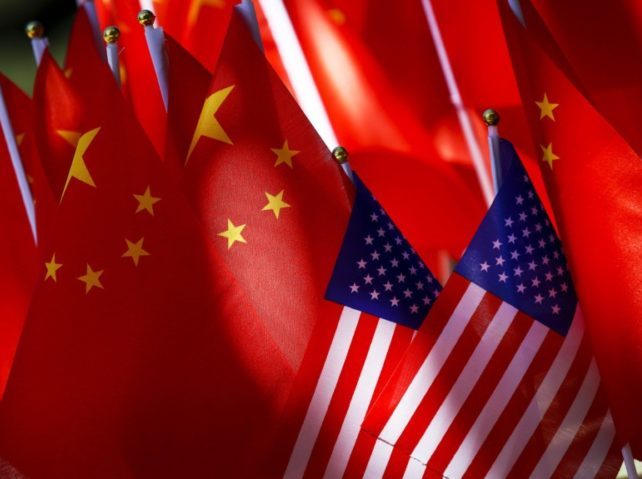China’s latest effort to rally the public for a protracted trade war with the United States is a “viral” song spread by the authoritarian government on social media, titled simply “Trade War.”
The song is ostensibly privately funded and repurposes the tune from an anti-Japanese song dating back to the 1960s. The new anti-American lyrics were written by Zhao Liangtian, a retired government official and “an accredited member of the Poetry Institute of China, which is affiliated with the Communist Party’s propaganda department,” as Bloomberg News noted.
According to Zhao, he paid a few hundred dollars to produce the song and persuaded other retirees to sing the chorus. He said he wrote the lyrics last year but was not motivated to record and release the song until trade negotiations between the U.S. and China took a turn for the worse this month.
The song is not exactly an earworm by popular music standards, and the messaging in the video is not subtle:
The lyrics include such fiery declarations as, “If the perpetrator wants to fight, we will beat him out of his wits!” and “Trade war! Trade war! Not afraid of the outrageous challenge!”
Zhao’s “Trade War” song is just one of many expressions of nationalist fervor pushed by the Chinese government over the past few weeks. Bloomberg News noted Chinese radio and TV stations have been ordered to begin playing the national anthem at 7:00 AM every morning.
The UK Daily Mail on Monday saw the proliferation of bombastic patriotic movies on Chinese television intensifying, accompanied by explicit instructions from state-run media telling citizens what to make of it:
State broadcaster CCTV’s movie channel on Thursday changed its prime-time schedule from live-streaming the red carpet of Asian Movie Week to a number of post-war film classics, including Heroic Sons and Daughters (1964), Battle on Shangganling Mountain (1954) and Surprise Attack (1960), according to a notice.
All the films are set during the Korean War, otherwise known in China as the War to Resist American Aggression and Aid Korea.
Hu Xijin, editor of state-owned tabloid the Global Times, tweeted on Sunday that the Battle on Shangganling Mountain should teach the Chinese that “there’s no equal negotiation without fighting’ while CCTV said that it is ‘using artworks like films to echo with the current era.”
“All trade wars are paper tigers,” said a riff on a Communist propaganda poster published on Wednesday showing People’s Liberation Army soldiers stamping on a pile of skulls.
The poster alludes to Mao Zedong’s famous pronouncement in 1956 that “All reactionaries are paper tigers” – a derogatory term which he also applied to American imperialism.
Despite all this heavy propaganda artillery, the South China Morning Post speculated China is losing on the publicity front of the trade war – outgunned by President Donald Trump’s Twitter feed, which has a remarkable knack for penetrating Beijing’s iron curtain of censorship and drawing attention on Chinese social media.
Media analysts quoted by the SCMP suggested China has been so heavy-handed in censoring information about the trade war that Trump has a free hand to shape the narrative and cause huge disruptions in both the Chinese Internet and stock markets. If that is the case, Beijing may have a difficult time recapturing the narrative by remixing 50-year-old songs and filling the TV schedule with 50-year-old movies.
